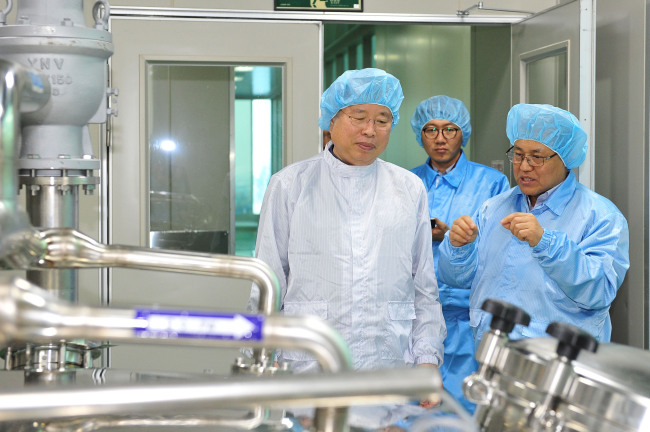LG Chem chief renews pledge to boost biopharma business
By Sohn Ji-youngPublished : Jan. 5, 2017 - 16:38
South Korea’s leading chemicals maker LG Chem is out to boost its newly merged pharmaceutical unit LG Life Sciences, with aims to drive up its competitiveness in the global red biotechnology, or medical biotech, sector.
LG Chem Vice Chairman and CEO Park Jin-soo visited LG Life Sciences’ production plant in Iksan, North Jeolla Province on Thursday, marking his first official on-site visit for 2017.
The plant produces LG Life Sciences’ flagship pharmaceutical products including “Factive,” a next-generation quinolone antibiotic approved by the US Food and Drug Administration, and other drugs.
LG Chem Vice Chairman and CEO Park Jin-soo visited LG Life Sciences’ production plant in Iksan, North Jeolla Province on Thursday, marking his first official on-site visit for 2017.
The plant produces LG Life Sciences’ flagship pharmaceutical products including “Factive,” a next-generation quinolone antibiotic approved by the US Food and Drug Administration, and other drugs.

Park’s visit came just days after LG Chem completed its merger with LG Life Sciences on Sunday to take the drugmaker back under its wing after 15 years. LG Life Sciences was spun off from LG Chem in 2001.
The merger is slated to lend a much-needed financial boost to LG Life Sciences, which despite its business capacity and competitiveness, has not grown to its full potential due to limited investment, according to LG Chem.
“It’s great that we have reunited under LG Chem after 15 years. Thank you for becoming a competitive actor in the red biotech business despite difficult business conditions,” Park told LG Life Sciences employees during the visit.
“Let us synergize our R&D and production capabilities to become a global player in the red biotech business,” he said.
In terms of R&D, Park emphasized the need to bridge LG Life Sciences’ drug development capabilities in red biotech with LG Chem-owned Farm Hannong’s expertise in green biotech, or biotechnology and genetic engineering applied to plants.
As for optimizing production, Park asked LG Chem to offer its mass production facilities and technologies to LG Life Sciences to raise the firm’s production efficiency and speed.
Looking ahead, LG Chem has pledged to inject around 300 billion won ($252 million) to 500 billion won every year into biotech research and development to spur the segment’s expansion. This is around three times larger than LG Life Sciences’ annual investment.
In a further move to support LG Life Sciences, Park is scheduled to visit the pharmaceutical firm’s vaccine production plant in Chungju, North Chungcheong Province on Friday.
By Sohn Ji-young (jys@heraldcorp.com)











![[Hello India] Hyundai Motor vows to boost 'clean mobility' in India](http://res.heraldm.com/phpwas/restmb_idxmake.php?idx=644&simg=/content/image/2024/04/25/20240425050672_0.jpg&u=)







